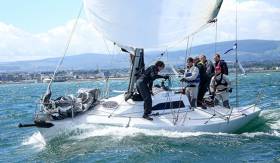Displaying items by tag: Johnny Swan
With the start of the Henri Lloyd Half Ton Classics Cup 2016 fast approaching on Monday 15 August the Half Ton Classics and the town of Falmouth are in the final stages of preparation for what promises to be a bumper edition of this delightful annual event. With at least 30 teams expected to travel to Falmouth from across the UK, Ireland and Europe, competition will be fierce as these historic little ships do battle against the spectacular backdrop of the Cornish coastline.
Among those already entered is Ireland's David Cullen, who won the 2015 Half Ton Classics Cup and will be back to defend his title in his 1985 Humphreys MG HS30 Checkmate XV. Originally named Blue Chip, the boat was purchased by Nigel Biggs in 2012 who put the boat through a major refit with Corby Yachts. David purchased her from Nigel over the winter of 2014/15 and she once again went into Corby Yachts, this time to have a new cockpit and transom fitted. At the time his 2015 victory David noted "It's a very tricky boat. The new boats are very powerful and we're still trying to figure it out. But we've learnt a lot this week and we look forward to moving forward and maybe being a little bit faster for Falmouth next year." With another year of sailing the boat under their belts since then it will be interesting to see if they are that little bit faster.
Also making the trip from Ireland for the event are Jonny Swan with Harmony, which was built by Priors of Burnham in 1980 to a Rob Humphreys' design for Mike Holmes and Tony Allen (of Holt-Allen fame) and is widely regarded as one of the most successful Half Tonners ever built. Kelly Boardman from Howth is racing King 1, which was previously owned by Cullen and Michael and Richard Evans will be competing in their Humphreys MG30 Big Picture.
Belgium will be putting forward several strong teams led by Philippe Pilate's 1978 Berret designed General Tapioca which won the 2009 Half Ton Classics Cup in Nieuwpoort, but broke their mast during the 2015 event so will be hoping for better luck this year. Also coming from Belgium are Ian Van Burm's 1983 Humphreys one off Fantasy and Thibaut Martin's MG HS30 Spip.
Heading up the British contingent will be 2014 Half Ton Classics Cup winner Peter Morton's 1977 Bruce Farr designed Swuzzlebubble which will be helmed by Greg Peck. Peter Rutter has entered his recently purchased 1985 Andrieu designed Insatiable, which has been renamed Quokka 9. From the East Coast come Anthony Meehan and Jane Mardell's Lynx and David Evan's Hullabaloo XV.
There will also be a strong showing from the local Falmouth Half Ton fleet with entries from Paul Pullen's Miss Whiplash, Mel Sharp's Demolition, John Hicks' Rampage, Geoff Davies' Scorpion and Jonathan Cunliffe's legendary Emiliano Zapata.
As well as racing in the event Paul Pullen is also a key player on the oganising committee and is very much looking forward to welcoming such a strong fleet of half tonners to his home town. "We have been working and training very hard this year, we are really looking forward to sailing against all the top boats in our own back yard. We're lucky to have some of Europe's best sailing waters right on our doorstep and with the experience, enthusiasm and commitment of Flushing Sailing Club and our local team of volunteers and sponsors behind us it's going to be a fantastic event."
The Henri Lloyd Half Ton Classics Cup 2016 is being hosted by Flushing Sailing Club and registration for the regatta opens on Saturday 13 August and continues on Sunday 14 August. Monday will feature a practice race followed by windward leeward races. From Tuesday to Friday the fleet will sail a mixture of windward leeward, regatta and coastal courses. Inshore races will be run in Falmouth Bay or Carrick Roads and the coastal race will be run within a 10-mile radius of Black Rock Beacon.
The boats will be moored at Pendennis Marina with the Regatta marquee located on Falmouth's Event Square, adjacent to the National Maritime Museum of Cornwall. An extensive social programme for competitors and their friends and families will center around Flushing Sailing Club, the Regatta marquee and the Museum, which will host the Championship Dinner.






























































